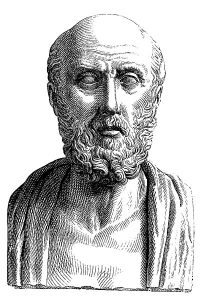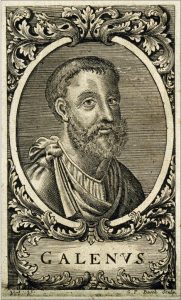 Greetings again and thanks for joining us as we continue examining topics which arise in Usurper’s Curse, the seventh book in my Lady Apollonia West Country Mysteries Series. This time I will speak of medieval medicine because it plays an important part in my story. There are several medical problems that occur in Usurper’s Curse, not the least of which was the illness of King Henry IV and how it was treated.
Greetings again and thanks for joining us as we continue examining topics which arise in Usurper’s Curse, the seventh book in my Lady Apollonia West Country Mysteries Series. This time I will speak of medieval medicine because it plays an important part in my story. There are several medical problems that occur in Usurper’s Curse, not the least of which was the illness of King Henry IV and how it was treated.
Medieval medicine owed much to the ancient Greeks, especially Hippocrates, shown to the right, and Galen. It also owed much to the Byzantine and Muslim worlds. Muslim contributions included both the transmission of Greek medical wisdom and new ideas which they developed. Hippocrates, living in the 5th and early 4th centuries BCE, was considered the Father of Medicine. Much of what we know about him was passed down to us by Galen who was born in 129 CE and died around 216 CE.
 Galen’s concepts of keeping the four body humors–blood, yellow bile, black bile, and phlegm–in balance continued to be very important in medieval medicine. An image of Galen is shown on the left. Methods such as bloodletting, enemas, and even vomiting were used to try to balance Galen’s four humors from the first millennium right on through the medieval period. Galen was also a skilled surgeon, even doing operations like modern cataract procedures. His medical practice emphasized checking the pulse and examining the urine of a patient.
Galen’s concepts of keeping the four body humors–blood, yellow bile, black bile, and phlegm–in balance continued to be very important in medieval medicine. An image of Galen is shown on the left. Methods such as bloodletting, enemas, and even vomiting were used to try to balance Galen’s four humors from the first millennium right on through the medieval period. Galen was also a skilled surgeon, even doing operations like modern cataract procedures. His medical practice emphasized checking the pulse and examining the urine of a patient.
Turning to the Muslim contribution, there is a five-volume medical encyclopedia, The Canon of Medicine, authored by Ibn Sina at the beginning of the 11th century. It was used as a standard medieval text until the 18th century in both the Muslim world and in Europe.
Despite these advances in formal medical practice over the centuries, it is true that superstition, astrology, folk remedies, and prayers to certain saints for intercession and healing played a major role in medical treatment in medieval England. This led to practitioners consulting the signs of the zodiac, and it led to people often seeing illness as God’s judgment on some perceived sin. Persons who were seen as helpful were often called healers.
Medieval healers ranged from those who were university trained doctors to surgeons who were trained by craft-guilds and on to barber-surgeons. The first western school to be recognized in medicine was in Salerno, Italy, but by the time of my novel, there were other universities in Western Europe that were also important in this field. An English Doctor of Physic, one who treated King Henry in my story, had been trained at Salerno. Another medical practitioner in my novel, an Italian of dubious background, also plays a role. He is eventually barred from treating King Henry IV, something which I based on a real event that occurred in the treatment of King Henry IV.
In the Middle Ages, surgery was not usually practiced by the university-trained doctors but by other practitioners as mentioned above. Barbers were needed to do tonsures for medieval monks as well as haircuts for civilians. They had the tools to cut into human flesh for medical reasons, including amputations that were often needed in military campaigns. While other surgeons were apprenticed by craft guilds, university-trained doctors usually were limited to consulting about surgeries. A doctor of physic, as mentioned above, was a medieval term commonly used for a physician or a medical doctor.
Join us next time when I will continue my discussion of topics from Usurper’s Curse.